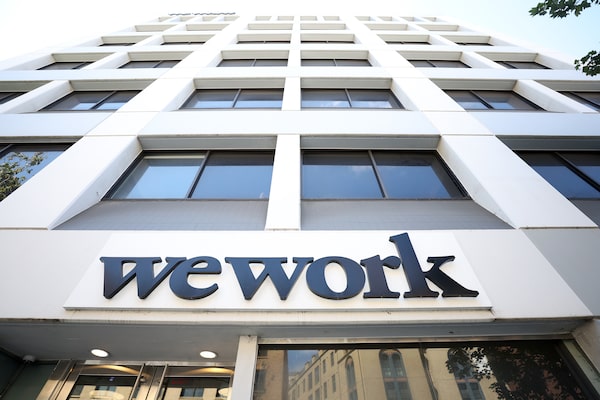
WeWork Inc. declared bankruptcy in November, an eventful month for investors.Justin Sullivan/Getty Images
Sam Sivarajan is an independent wealth management consultant and the author of two books on investing and decision-making.
There was a period in early November that was very eventful for investors. Samuel Bankman-Fried, the cargo-shorts-wearing whiz-kid founder of FTX, the cryptocurrency exchange, was found guilty on seven counts of fraud and conspiracy on Nov. 2. A few days later, on Nov. 7, onetime stock market darling WeWork Inc. declared bankruptcy. As a result, billions of dollars of investors’ money was flushed down the toilet. Sophisticated investors – including some of the largest Silicon Valley investors, investment banks, large pension funds – and high-profile celebrities got caught swimming naked when the tide went out, to paraphrase Warren Buffett.
Separately, the NFT craze, which swept through the world in 2021 and 2022, has imploded, and NFTs have seen a dramatic decline in value after the end of the hype cycle. NFTs, or non-fungible tokens, are digital assets that can be linked to products such as artwork and traded on open marketplaces using cryptocurrencies. At its peak, the NFT market boasted a significant monthly trading volume of US$2.8-billion, with pieces selling for millions of dollars. However, a recent report revealed that, since the initial frenzy subsided, an astonishing 95 per cent of NFTs have effectively become worthless.
As we look back on 2023, there are some key lessons to be drawn from these sorry tales.
Beware hubris
Masayoshi Son, the founder of SoftBank, made a colossal bet on WeWork, pushing its value to US$47-billion in 2019 – making its bankruptcy in 2023 a shocking fall from grace. WeWork’s nosedive is estimated to have cost SoftBank more than US$11.5-billion in equity losses, and another US$2.2-billion in debt is still on the line. More than that, it has called into question Mr. Son’s reputation as a savvy and prudent investor.
Mr, Son attributed his decision-making to his gut instinct, often referring to a founder’s spark or an intangible ability akin to the Force in Star Wars. However, this unwavering belief in his intuition may have blinded him to the warning signs, the opposition from his advisers, and even reportedly the reservations expressed by Adam Neumann, the founder of WeWork, himself. In a recent address to shareholders, Mr. Son confessed, “I fell in love with WeWork,” adding that “I may be more at fault than Adam, for telling him to be more aggressive.”
“You can recover from mistakes, but how do you recover from the perception that you don’t know what you’re doing?” said Aswath Damodaran, a professor and valuation expert at New York University’s Stern School of Business. “His actions say, ‘I am arrogant.’”
Overconfidence is one of the deadliest sins for an investor. A prominent study of retail investors found that overconfidence can explain high trading levels and the resulting poor performance of individual investors, with the most active traders underperforming the market by almost 7 per cent a year. In another study of 300 professional fund managers, 74 per cent believed that they had delivered above-average performance; the remaining 26 per cent viewed themselves as average: Not one thought they were below average – another clearly impossible outcome.
Herd hysteria
Both the NFT and FTX examples illustrate herd behaviour, or social proof, with dire consequences for investors. For example, one study found that individuals are more likely to be active in the stock market when a higher fraction of individuals in the local community are stock market investors. Social proof was found to be the driver of Wall Street analysts initiating research coverage of new companies. In other words, many research analysts began coverage of a new stock when peers had recently launched coverage. Local media coverage of S&P 500 companies strongly predicted local trading of those stocks – a reflection of both attention bias and herd behaviour. Clearly, herd behaviour can be deadly for investors.
What can investors do to avoid these pitfalls? Ask yourself the following questions.
What do you own and why? If your personal view of an investment differs from that of the market consensus, make sure you have well-founded reasons for your view. Ask yourself what has to go right for a decision to invest to be correct. What can go wrong to torpedo your investment? As Peter Lynch said: Know what you own and know why you own it.
What’s your track record? Over the past five years, how have your stock picks done? Honestly. Has your portfolio performed the way you believed it would when you made the investment? If not, why not? What’s different this time?
How much can you afford to lose when you are wrong? This is a key question to consider. Many things are out of your control. What happens to your investments if you are wrong? Can you afford that loss? Remember – you might be completely right about what will happen but be wrong on the timing and still lose your shirt. John Maynard Keynes observed: Markets can remain irrational longer than you can remain solvent.
Investors would do well to remember Warren Buffett’s sage advice: “Investing is not a game where the guy with the 160 IQ beats the guy with the 130 IQ. Once you have ordinary intelligence, what you need is the temperament to control the urges that get other people into trouble in investing.”
Are you a young Canadian with money on your mind? To set yourself up for success and steer clear of costly mistakes, listen to our award-winning Stress Test podcast.